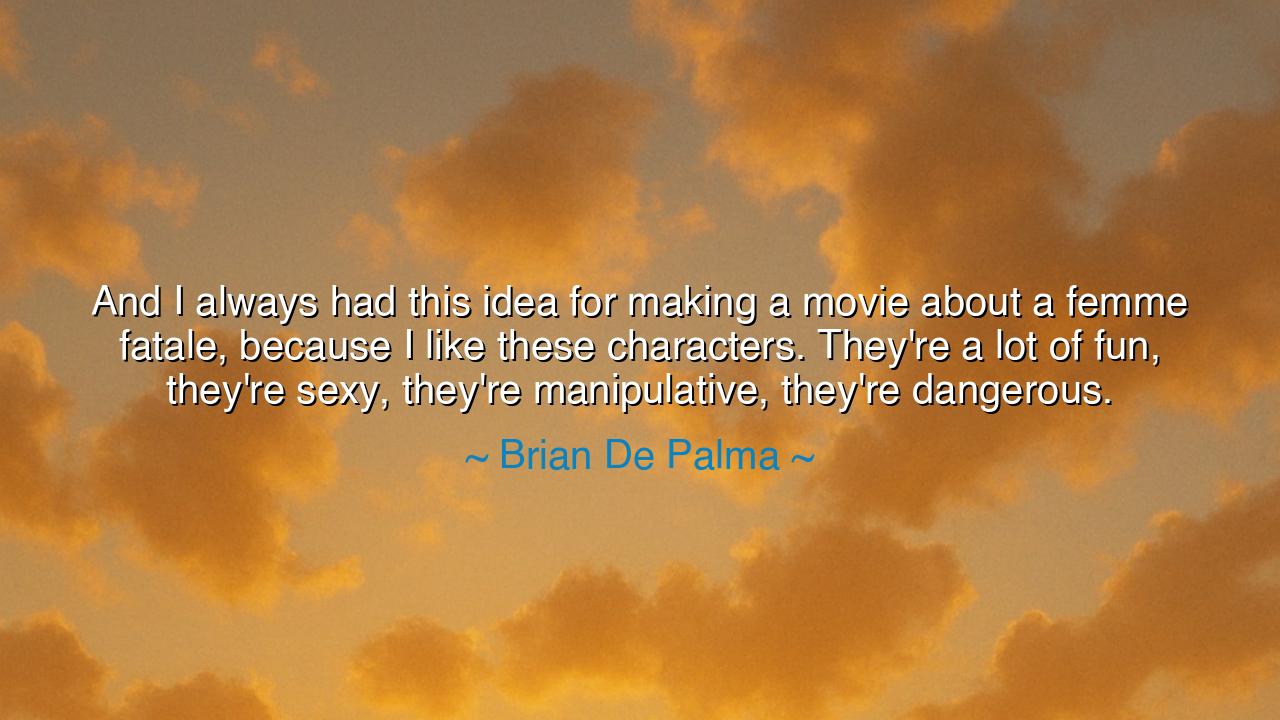
And I always had this idea for making a movie about a femme
And I always had this idea for making a movie about a femme fatale, because I like these characters. They're a lot of fun, they're sexy, they're manipulative, they're dangerous.






Hear now the words of Brian De Palma, master of the lens and seeker of shadows: “And I always had this idea for making a movie about a femme fatale, because I like these characters. They're a lot of fun, they're sexy, they're manipulative, they're dangerous.” In these words we glimpse not only the vision of a filmmaker but also the echo of an archetype as old as myth itself. For the femme fatale is not merely a character of cinema, but a symbol, a living riddle woven into the story of mankind: the alluring one who entices, the cunning one who destroys, the radiant flame that can warm or consume.
To speak of the femme fatale is to recall the ancients. Was not Circe such a figure, who with beauty and craft bent sailors to her will? Was not Cleopatra, whose gaze and wit could command empires, a woman feared as much as she was desired? These figures stand across time as embodiments of power cloaked in allure. They are not saints of purity, but storm-bringers, testing the strength and weakness of those who fall under their spell. In De Palma’s words, they are “fun,” for they dazzle the senses; they are “sexy,” for they awaken desire; they are “manipulative,” for they wield the human heart as a weapon; they are “dangerous,” for they remind us that beauty itself can be a battlefield.
Yet why do such characters enthrall us, both in myth and in film? It is because they embody the tension within the human soul—the pull between reason and passion, wisdom and folly, caution and surrender. To watch a femme fatale at work is to witness the eternal drama of temptation and downfall. In her, audiences see both the sweetness of longing and the peril of blindness. Just as the moth cannot resist the flame, so too the human heart cannot resist watching the dance of seduction and ruin.
History offers us a tale to make this truth clear. In the courts of France, the name Mata Hari still stirs whispers. She was a dancer, adorned in mystery and sensuality, who captivated generals and statesmen alike. Yet behind her beauty was a secret life, a web of espionage that led her into peril. To some, she was a victim of circumstance; to others, a true femme fatale, wielding allure as both shield and dagger. Her story reveals the fascination—and the danger—that comes when charm is used as power. She was not unlike the characters De Palma adored: thrilling, seductive, and ultimately fatal.
The filmmaker’s love for such figures speaks also to the truth of storytelling itself. Drama thrives where there is risk, where desire collides with consequence. The femme fatale is beloved not because she is virtuous, but because she is vivid, larger than life, a storm in human form. She awakens in us the recognition that danger is part of life, that temptation tests our will, that the line between passion and peril is thin indeed.
But the lesson, children of the future, is not merely to be enchanted by these characters. It is to see their deeper meaning. The femme fatale is a mirror. She shows us how easily hearts may be swayed, how fragile resolve can be in the face of beauty and desire. She warns us that to be blind to danger is to invite downfall. Yet she also reminds us of the vitality of passion, that life without risk, without fire, is a life unlived.
Thus, let this wisdom guide you: approach desire with eyes open, and danger with respect. Do not shun allure, but do not surrender blindly to it. Learn from the stories of the femme fatales in myth, history, and film—not to fear beauty, but to recognize the strength it holds. For in mastering the awareness of such power, you master yourself. And as Brian De Palma shows us, to embrace such characters is to embrace the thrilling, perilous, and unforgettable dance that lies at the heart of all great storytelling.






AAdministratorAdministrator
Welcome, honored guests. Please leave a comment, we will respond soon